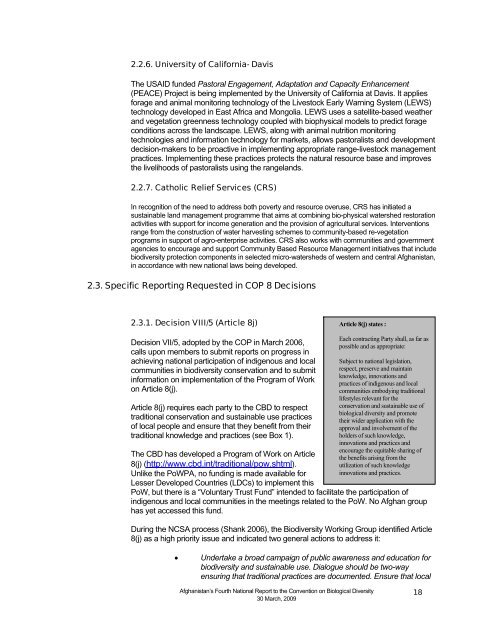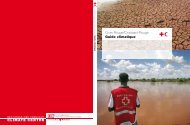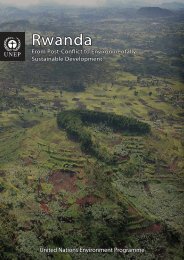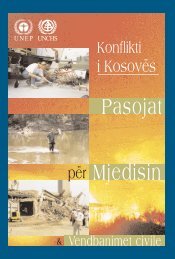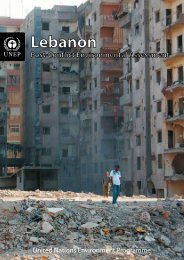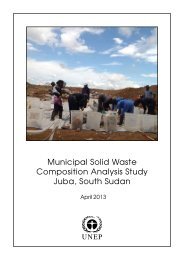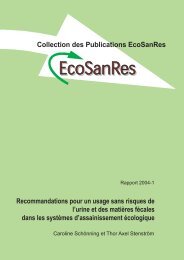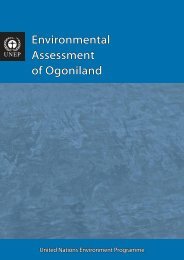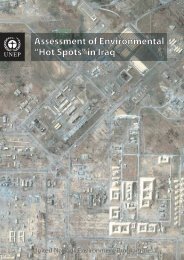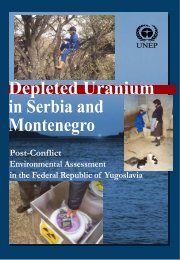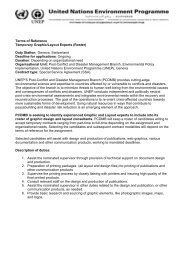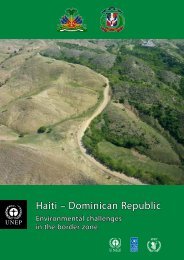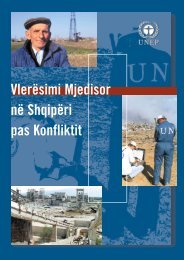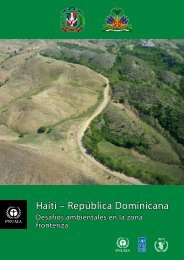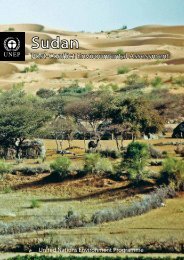Afghanistan's Fourth National Report to the Convention on ...
Afghanistan's Fourth National Report to the Convention on ...
Afghanistan's Fourth National Report to the Convention on ...
You also want an ePaper? Increase the reach of your titles
YUMPU automatically turns print PDFs into web optimized ePapers that Google loves.
2.2.6. University of California- DavisThe USAID funded Pas<str<strong>on</strong>g>to</str<strong>on</strong>g>ral Engagement, Adaptati<strong>on</strong> and Capacity Enhancement(PEACE) Project is being implemented by <str<strong>on</strong>g>the</str<strong>on</strong>g> University of California at Davis. It appliesforage and animal m<strong>on</strong>i<str<strong>on</strong>g>to</str<strong>on</strong>g>ring technology of <str<strong>on</strong>g>the</str<strong>on</strong>g> Lives<str<strong>on</strong>g>to</str<strong>on</strong>g>ck Early Warning System (LEWS)technology developed in East Africa and M<strong>on</strong>golia. LEWS uses a satellite-based wea<str<strong>on</strong>g>the</str<strong>on</strong>g>rand vegetati<strong>on</strong> greenness technology coupled with biophysical models <str<strong>on</strong>g>to</str<strong>on</strong>g> predict foragec<strong>on</strong>diti<strong>on</strong>s across <str<strong>on</strong>g>the</str<strong>on</strong>g> landscape. LEWS, al<strong>on</strong>g with animal nutriti<strong>on</strong> m<strong>on</strong>i<str<strong>on</strong>g>to</str<strong>on</strong>g>ringtechnologies and informati<strong>on</strong> technology for markets, allows pas<str<strong>on</strong>g>to</str<strong>on</strong>g>ralists and developmentdecisi<strong>on</strong>-makers <str<strong>on</strong>g>to</str<strong>on</strong>g> be proactive in implementing appropriate range-lives<str<strong>on</strong>g>to</str<strong>on</strong>g>ck managementpractices. Implementing <str<strong>on</strong>g>the</str<strong>on</strong>g>se practices protects <str<strong>on</strong>g>the</str<strong>on</strong>g> natural resource base and improves<str<strong>on</strong>g>the</str<strong>on</strong>g> livelihoods of pas<str<strong>on</strong>g>to</str<strong>on</strong>g>ralists using <str<strong>on</strong>g>the</str<strong>on</strong>g> rangelands.2.2.7. Catholic Relief Services (CRS)In recogniti<strong>on</strong> of <str<strong>on</strong>g>the</str<strong>on</strong>g> need <str<strong>on</strong>g>to</str<strong>on</strong>g> address both poverty and resource overuse, CRS has initiated asustainable land management programme that aims at combining bio-physical watershed res<str<strong>on</strong>g>to</str<strong>on</strong>g>rati<strong>on</strong>activities with support for income generati<strong>on</strong> and <str<strong>on</strong>g>the</str<strong>on</strong>g> provisi<strong>on</strong> of agricultural services. Interventi<strong>on</strong>srange from <str<strong>on</strong>g>the</str<strong>on</strong>g> c<strong>on</strong>structi<strong>on</strong> of water harvesting schemes <str<strong>on</strong>g>to</str<strong>on</strong>g> community-based re-vegetati<strong>on</strong>programs in support of agro-enterprise activities. CRS also works with communities and governmentagencies <str<strong>on</strong>g>to</str<strong>on</strong>g> encourage and support Community Based Resource Management initiatives that includebiodiversity protecti<strong>on</strong> comp<strong>on</strong>ents in selected micro-watersheds of western and central Afghanistan,in accordance with new nati<strong>on</strong>al laws being developed.2.3. Specific <str<strong>on</strong>g>Report</str<strong>on</strong>g>ing Requested in COP 8 Decisi<strong>on</strong>s2.3.1. Decisi<strong>on</strong> VIII/5 (Article 8j)Article 8(j) states :Decisi<strong>on</strong> VII/5, adopted by <str<strong>on</strong>g>the</str<strong>on</strong>g> COP in March 2006,calls up<strong>on</strong> members <str<strong>on</strong>g>to</str<strong>on</strong>g> submit reports <strong>on</strong> progress inachieving nati<strong>on</strong>al participati<strong>on</strong> of indigenous and localcommunities in biodiversity c<strong>on</strong>servati<strong>on</strong> and <str<strong>on</strong>g>to</str<strong>on</strong>g> submitinformati<strong>on</strong> <strong>on</strong> implementati<strong>on</strong> of <str<strong>on</strong>g>the</str<strong>on</strong>g> Program of Work<strong>on</strong> Article 8(j).Article 8(j) requires each party <str<strong>on</strong>g>to</str<strong>on</strong>g> <str<strong>on</strong>g>the</str<strong>on</strong>g> CBD <str<strong>on</strong>g>to</str<strong>on</strong>g> respecttraditi<strong>on</strong>al c<strong>on</strong>servati<strong>on</strong> and sustainable use practicesof local people and ensure that <str<strong>on</strong>g>the</str<strong>on</strong>g>y benefit from <str<strong>on</strong>g>the</str<strong>on</strong>g>irtraditi<strong>on</strong>al knowledge and practices (see Box 1).The CBD has developed a Program of Work <strong>on</strong> Article8(j) (http://www.cbd.int/traditi<strong>on</strong>al/pow.shtml).Unlike <str<strong>on</strong>g>the</str<strong>on</strong>g> PoWPA, no funding is made available forLesser Developed Countries (LDCs) <str<strong>on</strong>g>to</str<strong>on</strong>g> implement thisEach c<strong>on</strong>tracting Party shall, as far aspossible and as appropriate:Subject <str<strong>on</strong>g>to</str<strong>on</strong>g> nati<strong>on</strong>al legislati<strong>on</strong>,respect, preserve and maintainknowledge, innovati<strong>on</strong>s andpractices of indigenous and localcommunities embodying traditi<strong>on</strong>allifestyles relevant for <str<strong>on</strong>g>the</str<strong>on</strong>g>c<strong>on</strong>servati<strong>on</strong> and sustainable use ofbiological diversity and promote<str<strong>on</strong>g>the</str<strong>on</strong>g>ir wider applicati<strong>on</strong> with <str<strong>on</strong>g>the</str<strong>on</strong>g>approval and involvement of <str<strong>on</strong>g>the</str<strong>on</strong>g>holders of such knowledge,innovati<strong>on</strong>s and practices andencourage <str<strong>on</strong>g>the</str<strong>on</strong>g> equitable sharing of<str<strong>on</strong>g>the</str<strong>on</strong>g> benefits arising from <str<strong>on</strong>g>the</str<strong>on</strong>g>utilizati<strong>on</strong> of such knowledgeinnovati<strong>on</strong>s and practices.PoW, but <str<strong>on</strong>g>the</str<strong>on</strong>g>re is a “Voluntary Trust Fund” intended <str<strong>on</strong>g>to</str<strong>on</strong>g> facilitate <str<strong>on</strong>g>the</str<strong>on</strong>g> participati<strong>on</strong> ofindigenous and local communities in <str<strong>on</strong>g>the</str<strong>on</strong>g> meetings related <str<strong>on</strong>g>to</str<strong>on</strong>g> <str<strong>on</strong>g>the</str<strong>on</strong>g> PoW. No Afghan grouphas yet accessed this fund.During <str<strong>on</strong>g>the</str<strong>on</strong>g> NCSA process (Shank 2006), <str<strong>on</strong>g>the</str<strong>on</strong>g> Biodiversity Working Group identified Article8(j) as a high priority issue and indicated two general acti<strong>on</strong>s <str<strong>on</strong>g>to</str<strong>on</strong>g> address it:• Undertake a broad campaign of public awareness and educati<strong>on</strong> forbiodiversity and sustainable use. Dialogue should be two-wayensuring that traditi<strong>on</strong>al practices are documented. Ensure that localAfghanistan’s <str<strong>on</strong>g>Fourth</str<strong>on</strong>g> <str<strong>on</strong>g>Nati<strong>on</strong>al</str<strong>on</strong>g> <str<strong>on</strong>g>Report</str<strong>on</strong>g> <str<strong>on</strong>g>to</str<strong>on</strong>g> <str<strong>on</strong>g>the</str<strong>on</strong>g> <str<strong>on</strong>g>C<strong>on</strong>venti<strong>on</strong></str<strong>on</strong>g> <strong>on</strong> Biological Diversity30 March, 200918


